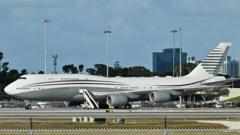The $400 million plane, gifted by the Qatari royal family, raises questions around legality and potential conflicts of interest.
US Receives Qatari-Built Boeing 747 for Air Force One Fleet Amid Controversy

US Receives Qatari-Built Boeing 747 for Air Force One Fleet Amid Controversy
The US government has accepted a Boeing 747 from Qatar as part of the Air Force One fleet, stirring mixed reactions.
The US government has officially accepted a Boeing 747 from Qatar, intended for the Air Force One fleet. This transaction, described as a gift from the Qatari royal family, has sparked significant debate, even among President Trump's staunchest supporters. Pentagon spokesman Sean Parnell confirmed the acceptance, emphasizing compliance with federal regulations. However, the announcement has ignited controversy due to the costs associated with modifying the aircraft for presidential use.
The aircraft's modification is expected to be costly, potentially running up to $1 billion, as it requires sophisticated security upgrades to withstand nuclear threats and enable mid-air refueling. The plane is projected to be housed at Trump's presidential library after his term concludes, adding layers to the legal and ethical discussions around the transfer.
Critics point to the Emoluments Clause of the US Constitution, which forbids foreign gifts to government officials without congressional approval. While the White House claims the plane was given to the defense department, and not personally to Trump, the absence of congressional consent raises eyebrows. Trump has defended the arrangement, asserting that it is a legal exchange between allies.
Previously, Trump had been vocal about his dissatisfaction with Boeing's delays in providing new Air Force One jets under contract, culminating in this unexpected deal. The current Air Force One fleet comprises two older 747-200 jets in service since the 1990s.
In a post on Truth Social, Trump characterized the gift as a "transparent transaction," emphasizing that the defense department benefits from obtaining an aircraft to temporarily replace aging models. However, the deal has not gone unnoticed. Qatari officials have stressed the government-to-government nature of the agreement, disconnecting it from personal relations.
Despite reassurances, influential political figures like Senators Rand Paul and Ted Cruz have voiced concerns about ethical implications and potential surveillance risks posed by accepting such a significant gift. The debate continues to evolve as the implications of this deal unfold in the political landscape.
The aircraft's modification is expected to be costly, potentially running up to $1 billion, as it requires sophisticated security upgrades to withstand nuclear threats and enable mid-air refueling. The plane is projected to be housed at Trump's presidential library after his term concludes, adding layers to the legal and ethical discussions around the transfer.
Critics point to the Emoluments Clause of the US Constitution, which forbids foreign gifts to government officials without congressional approval. While the White House claims the plane was given to the defense department, and not personally to Trump, the absence of congressional consent raises eyebrows. Trump has defended the arrangement, asserting that it is a legal exchange between allies.
Previously, Trump had been vocal about his dissatisfaction with Boeing's delays in providing new Air Force One jets under contract, culminating in this unexpected deal. The current Air Force One fleet comprises two older 747-200 jets in service since the 1990s.
In a post on Truth Social, Trump characterized the gift as a "transparent transaction," emphasizing that the defense department benefits from obtaining an aircraft to temporarily replace aging models. However, the deal has not gone unnoticed. Qatari officials have stressed the government-to-government nature of the agreement, disconnecting it from personal relations.
Despite reassurances, influential political figures like Senators Rand Paul and Ted Cruz have voiced concerns about ethical implications and potential surveillance risks posed by accepting such a significant gift. The debate continues to evolve as the implications of this deal unfold in the political landscape.




















